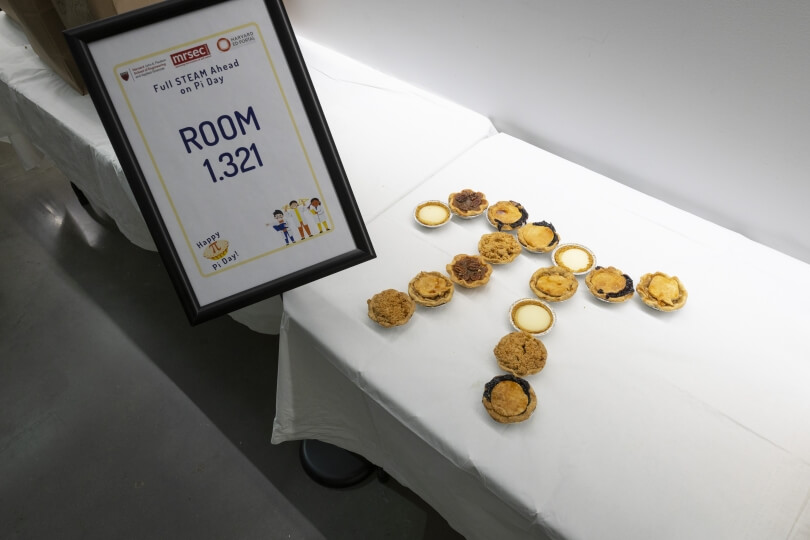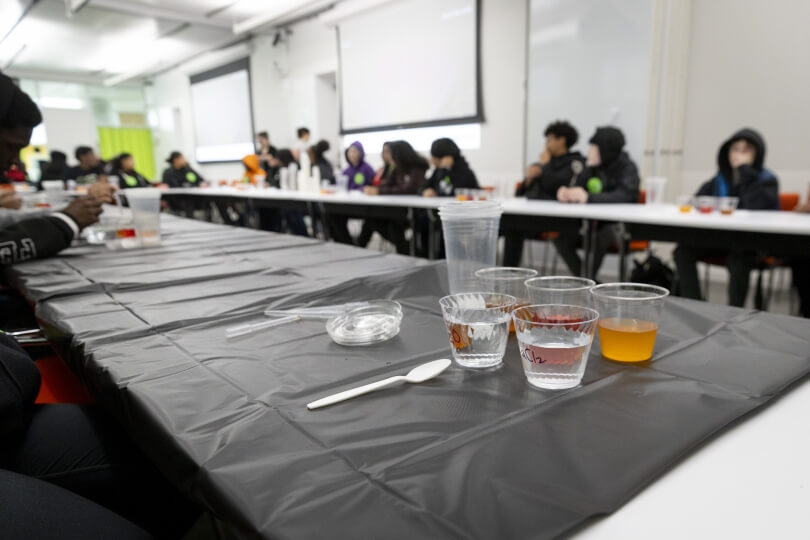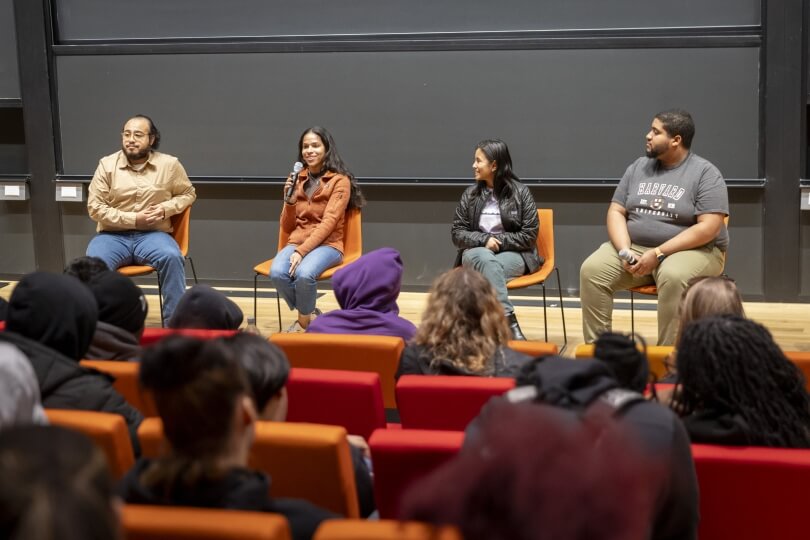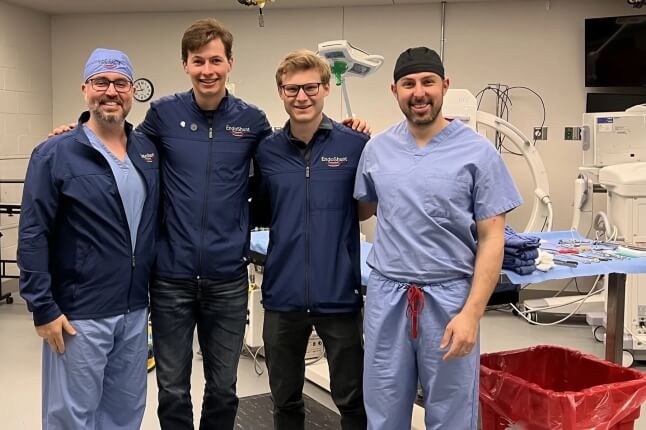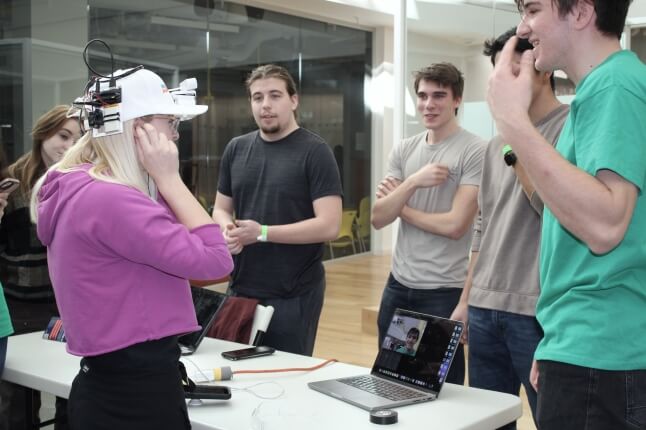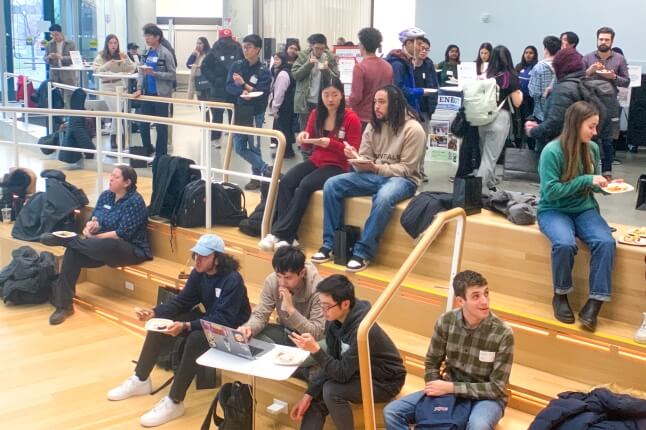News
Full STEAM Ahead on Pi Day at the Science and Engineering Complex (Niles Singer/Harvard University)
Laura Zichi remembers just how important science immersion was to her when she was in middle school and high school. Both of Zichi’s parents are scientists, and she always loved trips to science museums, where she could participate in hands-on demonstrations.
Zichi, a materials science and mechanical engineering Ph.D. student at the Harvard John A. Paulson School of Engineering and Applied Sciences (SEAS), helped run one of the stations at Full STEAM Ahead at the Science and Engineering Complex on Pi Day, March 14. Students from four Boston Public Schools spent the day doing hands-on projects while getting the chance to meet undergraduate and graduate engineering students.
“High school was when I really thought about what I wanted to do in the future, so it’s a great age to run this kind of event,” said Zichi.
The event was organized by SEAS Director of Community Engagement and Diversity Outreach Kathryn Hollar, Senior Program Administrator for Student Development Willvia Francois, and Education Outreach Programs Coordinator Sara Wenzel, and co-sponsored by the SEAS Office of Community Engagement and Diversity Outreach, Harvard Ed Portal Public School Partnership, and the National Science Foundation-funded Harvard Materials Research Science and Engineering Center.
Boston Green Academy students create popping boba bubbles (Niles Singer/Harvard University)
“A lot of our eighth graders are interested in science and how things work, but they don’t really get that many opportunities to do it,” said Darius Hale, an eighth-grade teacher at Gardner Pilot Academy. “This is a good opportunity for them, because a lot of time just getting materials can be hard. Having hands-on, safe activities for them to do is beneficial.”
Students from Gardner Pilot Academy, Boston Green Academy, Brighton High School and Mary Lyon Pilot High School spent the day at SEAS doing experiments that covered topics such as robotics, food chemistry and propulsion. Hale’s students learned about miracle berries, which contain a taste-altering compound that causes sour foods to taste sweet, and also melted chocolate onto a diffraction film to create a colorful holographic effect.
“It wasn’t really until college that I started thinking about science as a career,” said Kaley Brauer, a postdoctoral researcher at the Harvard Center for Astrophysics who ran the station for Mary Lyon Pilot High School. “I love events like this because they help show middle and high school students that science is tons of fun and that they’re capable of building and doing experiments themselves.”
Zichi helped run a station on homemade popping boba bubbles for Boston Green Academy. Brighton High School participants learned about robotics by constructing grippers from basic household items as well as small, easily constructed robots called bristlebots.
Pi Day concludes with a student panel (Niles Singer/Harvard University)
“We don’t get to go out every day and have fun like this,” said Christina Han, a seventh- and eighth-grade teacher at Brighton High School. “This was eye-opening for a lot of our students, and hopefully clears up what this career path actually looks like. We did some fun activities like making a little catapult, and a lot of our students didn’t know what the word ‘catapult’ meant before. We made robotic grippers using things you could find around the house, which shows that science is everywhere. You can do it anywhere.”
“I learned that there are a lot of different kinds of engineers and mechanics," an eighth-grader at Brighton High School added.
The event concluded with a panel of current graduate students and post-baccalaureate fellows. Attendees were able to ask about the specifics of life as an engineer, how to navigate the college application process, and how the panelists think about their own futures post-Harvard.
“These are things I think about every single day,” said panelist Adrian Portales, a research scholar at the Harvard Quantum Initiative “They asked me fundamental questions about life that I'm currently reflecting on, like what do I want, where do I see myself, what defines me. I could’ve easily talked about each of these subjects for at least an hour.”
Cutting-edge science delivered direct to your inbox.
Join the Harvard SEAS mailing list.
Press Contact
Matt Goisman | mgoisman@g.harvard.edu
